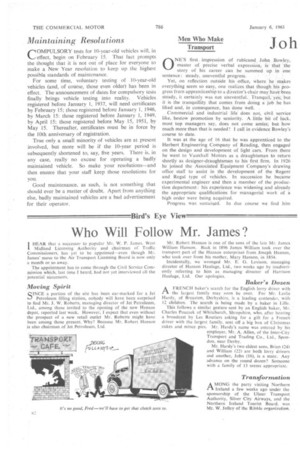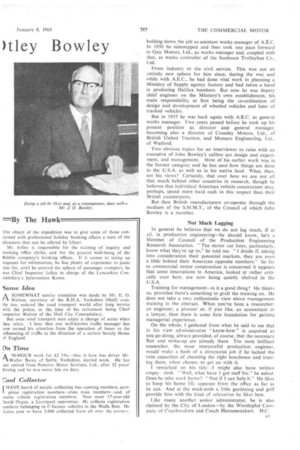Men Who Make Transport
Page 36

Page 37

If you've noticed an error in this article please click here to report it so we can fix it.
Joh
)-tley Bowley ONE'S first impression of rubicund John , Bowley, master of, precise verbal expression, is that the story of his career can be summed . up in one
sentence : steady, uneventful progress. . .'.
Yet, on reflection outside his .office, where he makes everything seem so easy, one realizes -that though his progress from apprenticeship to a director's chair may Italie been steady, it certainly was not uneventful.. Tranquil, ye-s; but it is the tranquillity, that comes from doing a ' job he has liked and, in consequence, has -done well.
Commercial and industrial life does not, civil service like, bestow promotion by seniority. .A little bit of luck, most top managers say, does not come amiss; but how much more than that is needed! I call in evidence Bowley's course to • date.
It was at the age of 16 that he was apprenticed to, the Herbert Engineering Company of Reading, then engaged on the design and development of light 'cars. From there he went to Vauxhall Motors as a, draughtsman to return shortly as designer-draughtsman to his. first firm. In 1926 he joined the Associated Equipment Company's drawing office staff to assist in the development of the Regent and Regal type of vehicles. In succession he became experimental engineer and then a member of the production department : his experience was widening and already the appropriate qualifications for managerial work of a high order were being acquired.
Progress was sustained. In due course we find him
holding down the job as assistant works manager of A.E.C. In 1950 he sidestepped and then took one pace forward to Guy Motors, Ltd., as works manager and, coupled with that, as works controller of the Sunbeam Trolleybus Co., Ltd.
From industry to the civil service. This was not an entirely new sphere for him since, during the war and while with A.E.C., he had done vital work in planning a Ministry of Supply agency factory and had taken a hand in producing Halifax bombers. But now he was deputy chief engineer on the Ministry's own establishment, his main responsibility at first being the co-ordination of design and development of wheeled vehicles and later of tracked vehicles.
But in 1955 he was back again with A.E.C. as general works manager. Two years passed before he took up his present position as director and general manager, becoming also a director of Crossley Motors, Ltd., of British United Traction, and Monaco Engineering, Ltd., of Watford.
Two obvious topics for an interviewer to raise with an executive of John Bowley's calibre are design and experiment, and management. Most of his earlier work was in the former category and he has seen how things are done in the U.S.A. as well as in his native land. What, then, are his views? Certainty, that over here we are not all that much behind other countries in research, though he believes that individual American vehicle constructors may, perhaps, spend more hard cash in this respect than their British counterparts.
But then British manufacturers co-operate through the medium of the S.M.M.T., of the Council of which John Bowley is a member.
Not Much Lagging In general he believes that we do not lag much, if at all, in production engineering—he should know, he's a Member of Council of the Production Engineering Research Association. "The motor car boys, particularly, know what they're up to," he told me. "I doubt if, taking into consideration their potential markets, they are even a little behind their American opposite numbers." So far as commercial motor construction is concerned it appears that some innovations in America, looked at rather critically over here, are now being quietly shelved in the .U.S.A.
Training for management—is it a good thing? He thinks so, provided there's something to graft the training on. He does not take a very enthusiastic view about management training in the abstract. When you've been a researcher; an engineer; a planner or, if you like, an accountant or a lawyer, then there is some firm foundation for gaining managerial experience.
On the whole, 1 gathered from what he said to me that in his view administrative " know-how " is acquired as you go along, always provided, of course, that the necessary flair and make-up are already there. The most brilliant researcher, the most resourceful production engineer. would make a hash of a directorial job if he lacked the twin capacities of choosing the right henchmen and trusting them, when chosen, to get on with it.
remarked on his tidy---! might also have written empty-desk. "Well, what have 1 got staff for," he asked. Does he take work home? "Not if I can help it." He likes to keep his home life separate from the office as far as he can. And at the week-ends a little gardening and golf provide him with the kind of relaxation he likes best.
Like many another senior administrator, he is also claimed by the City of London—by the Worshipful Company Of Coachmakers and Coach Harnessmakers_ H.C.




















































































































